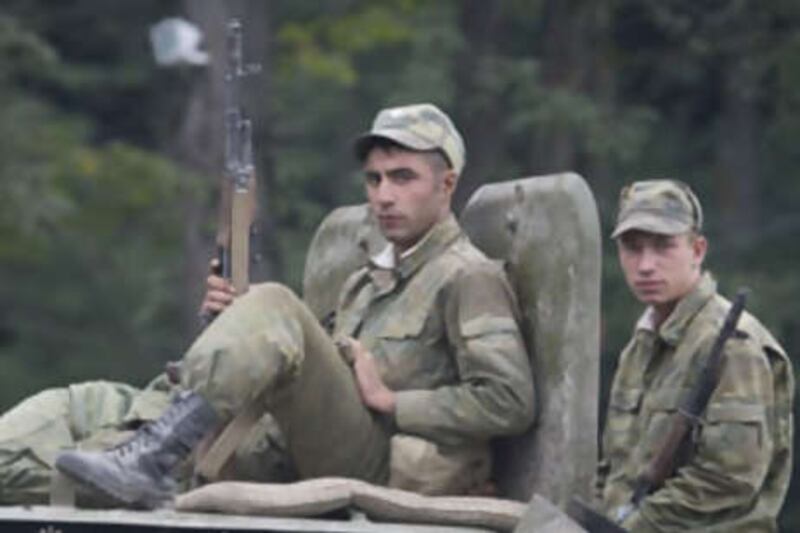A conflict over the fate of 100,000 people living on a mountain on the far fringes of Europe might seem little reason to disturb the summer holidays of the world's diplomats. But there is one thing that Russia and the former Soviet state of Georgia agree on: the war will decide the balance of power in eastern Europe and determine how the European Union ensures energy supplies for decades to come.
As Russian bombers widened the conflict yesterday, attacking Georgian army bases, a port and an oil refinery, the president of Georgia, Mikheil Saakashvili, raised the stakes. "The future world order is to be decided in Georgia," he said during a televised meeting of his national security council. The Russians would no doubt agree - but they see a radically different outcome, with Georgia humiliated.
With the war in its second day, analysts believe that Mr Saakashvili - a US-trained lawyer who has devoted four years to building a close relationship with George W Bush, the US president - has overplayed his hand and so ruined Georgia's chances of joining the Nato alliance and escaping the Russian embrace. By attempting to bring to heel the Russian-backed separatist region of South Ossetia by military force, he has given the Kremlin a chance to flood the territory with its tanks and establish a foothold on the south side of the Caucasus Mountains.
"For years the Russians have undermined the stability in Georgia, and tried to show that Saakashvili is a hot-headed and unreliable personality and that his country is not a fit candidate for Nato membership," said James Nixey, a Russia observer at the Royal Institute of International Affairs in London. "I think Saakashvili has walked into a Russian trap. His attempts to show Georgia as a stable, western-style country are in tatters."
If the war came as a surprise to the world, it had long been prepared for by both Georgia and Russia. Mr Saakashvili came to power in 2004 promising to restore central control over two areas that broke away in the early 1990s, the north-western coastal region of Abkhazia and the mountainous territory of South Ossetia. These conflicts remained frozen for a decade and a half - the residents of the breakaway regions were supported by Russia, and the Georgian government was too weak to force them back into line. The Kremlin has given most of the South Ossetians Russian passports. Known as the "loyal tribe" of the Caucasus, the Ossetians are comfortable living in a multi-ethnic Russia, while they see Georgia as prone to fits of destructive nationalism.
To regain the lost territories, Mr Saakashvili turned to the West for protection against Russia. Tbilisi, the capital, is adorned with posters of him embracing Mr Bush while European Union banners outnumber the country's national flag. A visitor might think that Georgia was the 51st state of the United States and the 28th member of the EU - but these are only aspirations. To speed Georgia's entry to Nato, the army has been remodelled on US lines. It sent 2,000 soldiers to Iraq - the third largest contingent after the US and Britain - though those troops are now returning to defend the homeland.
Georgia's embrace of the West bore fruit in April, when a Nato summit promised the country that it would one day become a member - though no calendar was mentioned. This was seized on as a great triumph by the Georgians, but as a red flag by the Russians. In fact it was a diplomatic fudge: key Nato members such as Germany distrust the irrepressible Mr Saakashvili. For Germany, a good relationship with Russia - a resurgent power that supplies the gas that heats homes in continental Europe - is more important than the fate of a poor, unstable country of 4.5 million.
Although it has no oil, Georgia plays a key role in exporting energy from the Caspian basin and central Asia. These two areas used to be under Moscow's control but now, thanks to a pipeline that runs from Baku, the Azerbaijani capital, on the Caspian Sea through Georgia to the port of Ceyhan on Turkey's Mediterranean coast, these riches are beyond Moscow's reach. Any sign that Russia was returning to its old position of dominance south of the Caucasus Mountains would cast doubt on the advantages of this pipeline, giving Moscow a stranglehold on both gas and oil.
Russia now believes that Mr Saakashvili made the mistake of believing his own propaganda and relied too much on Nato rushing to his aid. Instead, the West has responded only with calls for ceasefires and the removal of troops, which analysts say mask some annoyance at Mr Saakashvili. "The reactions from the US have been rather mild so far," said Andrei Kortunov, president of the New Eurasia Foundation, a Moscow think tank backed by US and European funding. "I am not sure this military action by Saakashvili was approved by Washington in advance."
Mr Kortunov believes that Russia's goals are not to overthrow the Georgian government, but only to "restore the status quo" in South Ossetia and demonstrate the Kremlin's role as guarantor of stability in the Caucasus region. These modest goals disguise the fact that the Kremlin is likely to end up in a perfect position to dictate Georgia's future. Georgia can enter Nato, provided it abandons Abkhazia and South Ossetia. Or it can stay out of Nato, and retain some hope of regaining these lost territories.
In either case, the Kremlin will have made a point: Nato is not going to go to war with Russia over a small former Soviet state. Other former Soviet states thinking of joining Nato - such as Ukraine - can draw a lesson: security comes from good relations with the Kremlin, not vague promises from Brussels. @Email:aphilps@thenational.ae






